Juliana Pigs Pros And Cons – Complete Owners Guide
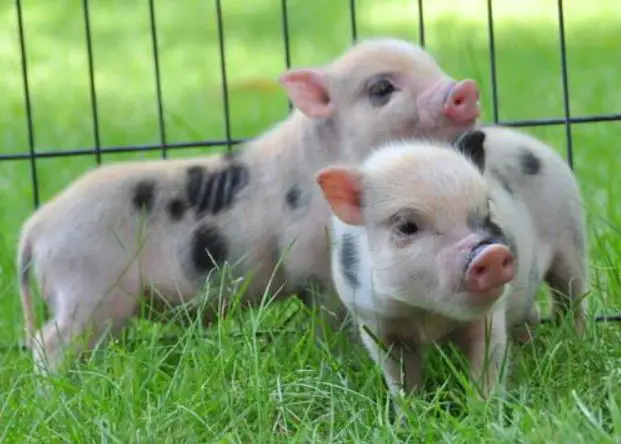
Affectionately known as “the miniature painted pig” due to its colourfully spotted appearance, Juliana pigs are one of the smallest and most popular breeds of “miniature” as well as pet pigs.
They originated from Europe through selective breeding, have a reputation for making excellent family pets, and have a lean, long, athletic appearance. In addition to this, they usually have either rust, silver, black, cream, red, or white-coloured bodies.
These mini pigs belong to the Suidae swine family and are generally celebrated and lauded by anyone who’s raised them. Through the course of this article, we will discuss and become better acquainted with these household favourites.
Eurasian Boar Species
Juliana pigs are considered an Eurasian boar subspecies and were bred using several varieties of pigs.
Said to be the smallest of the miniature hogs, their body builds and facial structure is highly similar to that of a feral or large pig and while they’ve been around for quite a while, their root species remains a mystery due to their crossbreeding.
Consequently, these pigs are referred to by their domestic name because Juliana pigs haven’t been officially classified.
As stated by the Cincinnati Zoo, swine are native to Europe as well as Asia but are a common sight throughout the world, and Juliana pigs are no exception.
Miniature Painted Pig
Due to their colorful appearance and resemblance to large and feral hogs, Juliana swine are affectionately known by the nickname “Miniature Painted Pig.”
They shouldn’t appear sluggish or exhibit a pronounced potbelly and generally have long snouts and lean frames.
Their small bodies are usually either rust, silver, black, cream, red, or white-coloured and while they do possess the aforementioned resemblance to bigger pigs; they are frequently described as “cute” or “adorable.”
Domesticated pigs are known for being friendly, smart, energetic, social, gentle animals who are fun to have around, and the Juliana more than lives up to this reputation.
This breed is highly intelligent, curious, and fast learning, with some owners even considering them easier to train than dogs. They also have long lifespans and some owners have reported pigs living upwards of 15 years.
In addition to this, they generally have a very peaceful temperament which makes them excellent family pets.
These pigs were bred with other miniature breeds like Kunekune and Potbelly pigs to work with humans in farms and homes.
As it happens, well-trained pigs have been reported to get along well with cats and other animals and are frequently described as “dogs, but smarter.”
Juliana Pigs Overview Table
| Size | Small.
Generally considered to stay around 10 to 16 inches tall and weigh between 20 and 40 pounds when fully grown. |
| Personality | Known for being compassionate, affable, and fun-loving family pets who get along well with other animals. |
| Temperament | Due to their being bred specifically for work with humans, these pigs are very easy-going animals with laid-back temperaments. |
| Tendency To Bite | Juliana pigs are known for being very peaceful animals and have a low tendency to bite, but like all mini pigs, they can be sensitive; and become destructive when spoilt. |
| Maintenance 6/10 | As stated by BCSPCA, while these pigs are frequently compared to dogs; they have other breed-specific needs which can be difficult to accommodate in a house setting. |
| Family Pet 4/5 | These pigs make excellent, easily trainable companions and are bred for this very reason, but as with all pets they have individual requirements, and acquiring one will require patience, commitment, and responsibility. |
| Intelligence | Swine are ranked among the most intelligent animals on earth and Juliana pigs, in particular, are renowned for their good memories. These are highly intelligent family pigs. |
| Exercise Needs | Pigs are known to be animals who get bursts of energy and members of the Juliana breed will require enough room for exploration and daily walks to combat boredom. |
| Health Issues | According to Mini Pig Info, the top five health issues faced by miniature pigs are obesity, arthritis, Uterine neoplasia, dental issues, and dry skin. |
| Life Expectancy | 10 – 15 years.
Although pigs have been reported to live longer than this figure, sadly many don’t live past the age of 5 due to genetic disorders caused by inbreeding;- as well as issues with their skeletal and immune systems. |
| Price | Purebred prices range from $750 to over $3,500. |
Pros Of Juliana Pigs
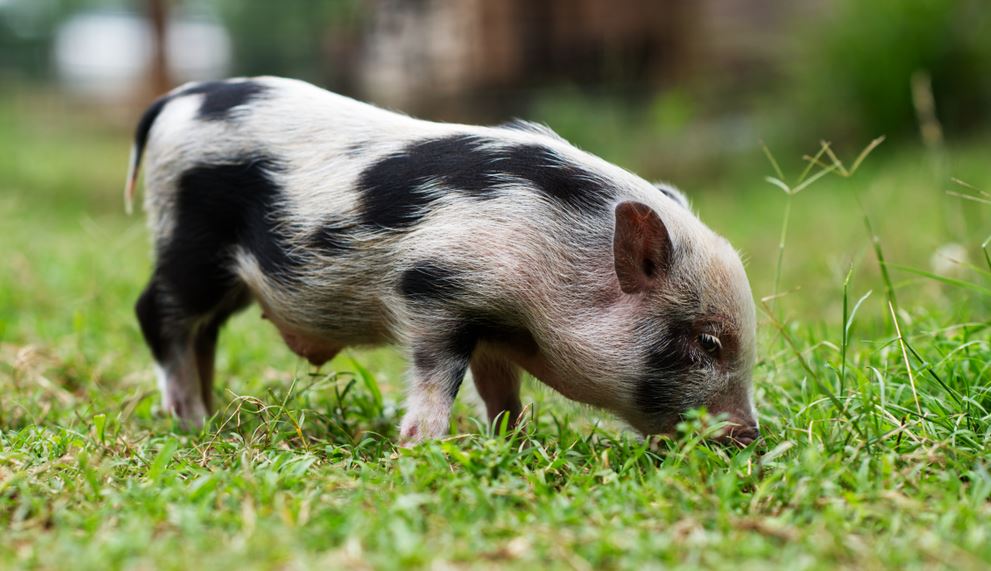
Long Lifespan
As we’ve mentioned above, some Juliana pigs have been reported to live upwards of 15 years, but keep in mind that our four-legged friends will need a nutritionally complete diet and access to adequate health care in order to reach this milestone.
As such, your pointy eared companion could potentially be around for decades to come.
Affable And Adaptable
These pigs have a reputation for being exceptionally kind as well as compassionate animals and some have even been reported to get along well with cats, dogs, and other house pets.
As a result, Juliana pigs make excellent companions and playmates to both young and old.
Unfussy Eaters
These omnivores have an opportunistic approach to feeding and will eat most things, as long as they appear edible, but thrive on balanced, nutritionally rich diets.
In addition to this, they possess resilient stomachs and can eat most things without running the risk of falling ill.
Highly Intelligent
Pigs are considered to be one of the most intelligent animal species on earth and Juliana pigs have been reported to possess an intellect comparable to that of a 3 to 4-year-old child.
Adding to this, they are also compassionate animals who tend to form deep bonds with their owners.
Clean Animals
Despite their reputation, swine don’t have sweat glands and produce minimal perspiration as a result; making them very clean animals without much of an odour.
Furthermore, they have a tendency to assign designated lavatories in an effort to avoid soiling their living spaces.
Easy To Train And Affordable
As a result of their excellent memories and high intelligence, Juliana pigs are focused animals who easily litter train and can be taught commands. Moreover, this affectionate breed is relatively inexpensive to keep, with feed reported to cost between $10 and $20 by Mother Earth News.
Low Maintenance
Juliana pigs are easy-going pets and all they require to thrive is a balanced diet, enough room, and sufficient exercise. These are highly intelligent, playful and curious animals who will need to be mentally stimulated.
The only additional measures include oral deworming, which is done twice a year, and hoof trimming as needed; which makes them fairly manageable animals.
Excellent Pets
As we’ve mentioned above, these pigs were bred specifically to work with humans, and unlike some other pets, like male dogs who can sometimes display territorial behaviour; Juliana pigs make brilliant companions regardless of gender.
These are patient animals who can be very loving and loyal pets.
Hypoallergenic
As a consequence of their having hair instead of fur; pigs are hypoallergenic, meaning they are much less prone to cause allergic reactions. This also means they can be bathed using gentle human products such as baby and dandruff shampoo.
Cons Of Juliana Pigs
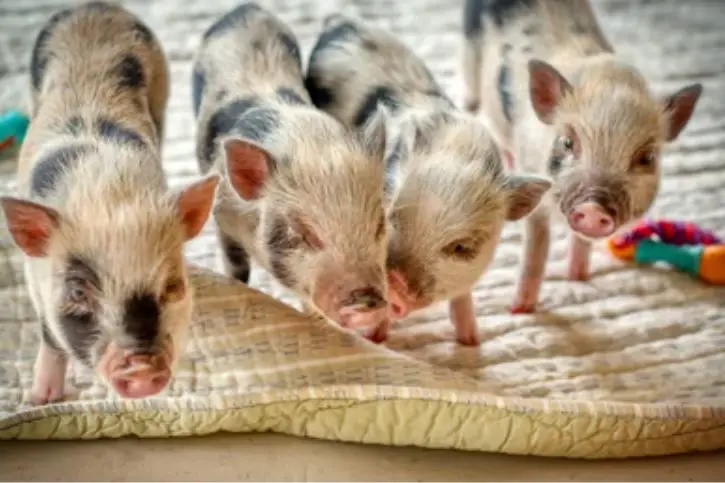
Can Become Expensive
Juliana pigs have been sold for prices in excess of $3,500 and unfortunately, when taking vet bills and large appetites into account the price will only climb from there.
Adding to this, it’s highly recommended by veterinarians to spay and neuter these pigs as this can prevent diseases. Consequently, Juliana pigs can become fairly expensive pets.
Sensitive And Potentially Destructive
Pigs are sensitive animals who display a wide range of emotions and Juliana pigs specifically have been noted to be stubborn and potentially destructive when stressed, depressed, or frustrated.
This is usually a result of mismanagement or abuse however and, according to Pet Pig World, this behaviour can be easily corrected through formal training.
Needs Enough Space
These are curious pigs, and this trait in combination with their aforementioned energetic and playful personalities means they will need enough space to run around and receive adequate exercise if you don’t want them to become despondent, potentially disobedient, or destructive.
This can be quite an undertaking and thus, a disadvantage to owning pigs.
Can Easily Become Overweight
As we’ve stated above, Juliana pigs are indiscriminate eaters with big appetites. Unfortunately, this means they can be prone to obesity which can lead to a variety of potential health issues.
Consequently, their daily food supply will need to be rationed to 1-2% of their body weight in order to prevent this.
Tendency To Root And Dig
Rooting and digging are natural behaviours for swine and the reason for this usually boils down to one or a mixture of the following; habitation, relaxation, communication, and nutrition.
Unfortunately, this behaviour can lead to lots of messes as well as potentially destructive behaviour from your pet pig.
Vets Can Be Difficult To Find
In most cases, it is highly unlikely that pet clinics that treat cats and dogs accept swine; and as such, it is vital to have a vet who works with swine in place before adding a Juliana pig to your family.
Due to their being prey animals, these pigs also tend to disguise the fact that they are sick or injured and, as a result, you will need to have the knowledge as well as skills necessary to recognize common symptoms of disease, injury, or infection in your Juliana pig.
Tips For Raising A Juliana Pig:
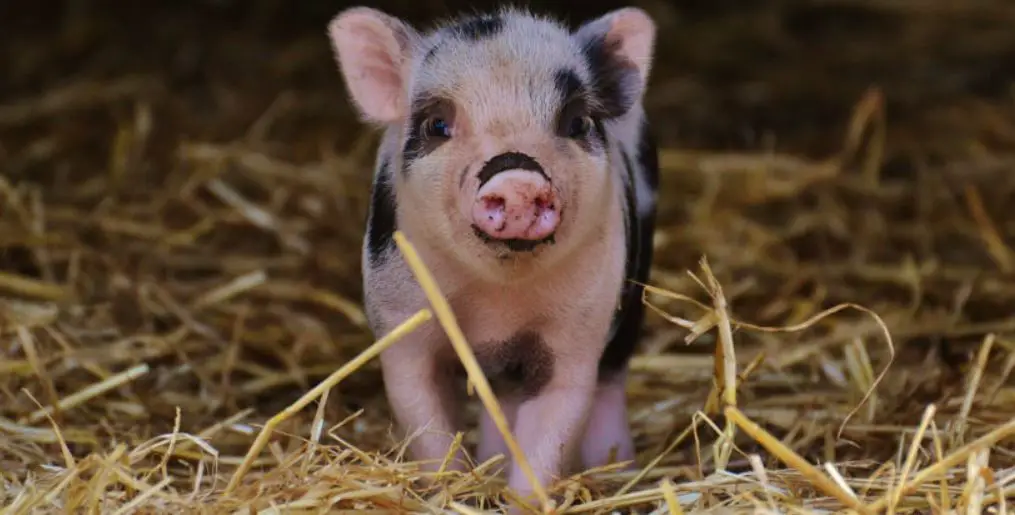
Juliana pigs are herd animals and this will need to be catered to, as depriving them of social interaction could lead to restlessness and misbehaviour.
Additionally, studies have shown that these pig companions tend to function better in cooler climates and drink between 5 and 10 litres of water per day. Their spatial needs will also have to be met; as they, like most pigs, have a tendency to root and dig.
Furthermore, they will benefit from annual medical check-ups and frequent hoove, nail, and tusk trimming; as neglecting to do so could lead to soreness, infection, locomotive issues, appetite loss, as well as potential injuries to their body structure.
Last but not least, meat consumption isn’t encouraged when it comes to these curly-tailed omnivores due to a higher risk of falling ill and spreading diseases.
Interesting Facts About Juliana Pigs:
You might be surprised to find out that owning a pet pig is illegal in some parts of the world and this is usually due to zoning laws that classify pigs as farm animals exclusively; effectively barring pigs from non-farming or agricultural settings.
Other surprising facts about the Juliana include their being the second most popular breed of pot-bellied pig, as well as their habit of curling their tails when excited or in motion, and the fact that they constantly communicate with each other using an extensive and distinct vocabulary.
You can find out even more about Juliana and pot-bellied pigs at large through the following video.
Conclusion
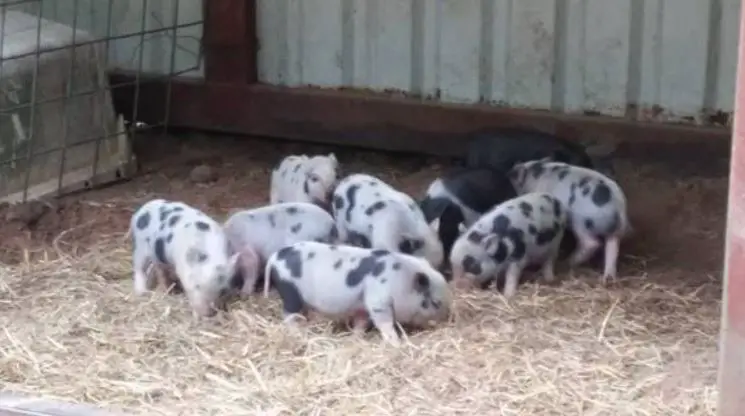
So there you have it, in essence, Juliana pigs are amazing pets who have been hailed by some as, “the best and strangest dog you’ll ever love.” They are affectionate, quiet and entertaining animals who will thrive in happy, loving homes and make novel pets.
However, owning a pig is completely different to owning a cat or dog, and special attention will need to be applied to accommodate their spatial, entertainment, dietary and healthcare requirements.
Adding to this, you will need to ensure you have plenty of patience and a sufficient budget to look after your new pig companion.
That being said, don’t feel discouraged by these potential obligations, you are capable of great things and can do accomplish anything if you put your mind to them.
Thank you for joining us, we hope this article has satisfied your curiosity and roused your interest in acquiring a pet or Juliana pig.


